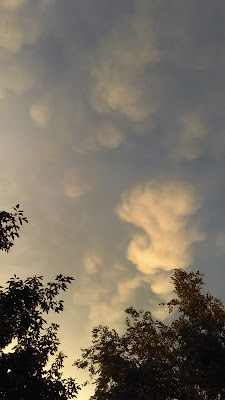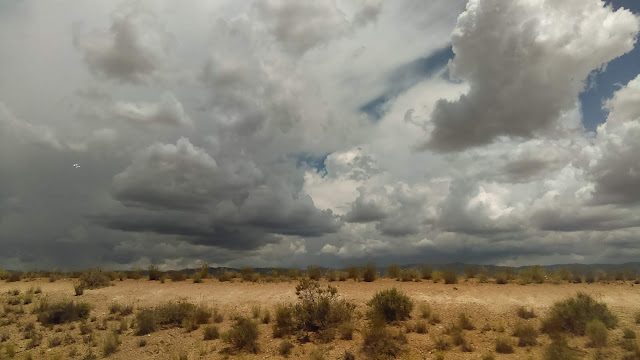The Art of Hiding
 |
| Is that a profile of a face hiding in the cloud? |
I must admit that I had also been reading a lot of what I would describe as signs that there are quite a few people questioning just what they should believe in today's world, even and perhaps especially if it is something that concerns themselves. The world economies are rolling along say the markets, and people are spending more and wondering when or if this bull stock market will end? And while that mood may certainly be there it is not how I would describe myself; is it how you would describe yourself? There were these hidden doubts as if this outside world I was encountering in the news and other media was different from the one I was actually experiencing. Added the words by author Yiyun Li: “Do you, a friend asked me years ago, understand that you are in people’s real lives? I remember feeling shocked—at the time, the only real people were my characters.” It would seem that in writing fiction Li built herself a structure from which she could see but not be seen, and it’s turned out to be not a shelter but a prison. Or it’s a hiding place that unbeknownst to the hider leaves her from a certain angle entirely visible. “I have been asked throughout my life: what are you hiding?” she writes. “I had only wanted to stay invisible.” Yet she chose “a profession that makes hiding less feasible...Had I remained a scientist, would I have turned out differently—calmer, less troubled, more sensible? Would I have stopped hiding, or become better at it?” Her words seemed to echo and ask if she was alone or if perhaps others were hiding something, or perhaps wanting to hide something, as well? And was that something that was in plain sight? Or was it just that we just couldn't see it?
 It was with these thoughts that I found myself sitting in on a group therapy session. But unlike AA (Alcoholics Anonymous) or NA (Narcotics Anonymous) meetings which feature their 12-steps and what many view as having somewhat religious overtones, (criticized heavily in an earlier piece in The Atlantic although one does have to look at the results and how many people have indeed been helped and gotten off of drugs and alcohol), this was more of a face-your-demons exposure, complete with what I thought were rather simple questions but ones which proved surprisingly difficult to answer for everyone, questions that sought to dig deep into those hidden part of ourselves that many of us never, ever look at, those parts of ourselves that we don't want to face or that we convince ourselves aren't really that important. It may be a closeted secret, one of repressed anger or of wanting to come out with how you truely feel about wanting to change jobs or relationships or lifestyles. But for many it was something much more than that, something unexpected and proving uncontrollable, a disease. And I was here to learn...
It was with these thoughts that I found myself sitting in on a group therapy session. But unlike AA (Alcoholics Anonymous) or NA (Narcotics Anonymous) meetings which feature their 12-steps and what many view as having somewhat religious overtones, (criticized heavily in an earlier piece in The Atlantic although one does have to look at the results and how many people have indeed been helped and gotten off of drugs and alcohol), this was more of a face-your-demons exposure, complete with what I thought were rather simple questions but ones which proved surprisingly difficult to answer for everyone, questions that sought to dig deep into those hidden part of ourselves that many of us never, ever look at, those parts of ourselves that we don't want to face or that we convince ourselves aren't really that important. It may be a closeted secret, one of repressed anger or of wanting to come out with how you truely feel about wanting to change jobs or relationships or lifestyles. But for many it was something much more than that, something unexpected and proving uncontrollable, a disease. And I was here to learn...You can watch this sort of "reality" on television where families and friends seem to try and talk some "sense" into a person trapped in an addiction, an almost desperate attempt to help them to snap out of their apparent self-destruction and wanting them only to return to society and to a normal life. Or so say the brochures and ads. Such hidden addictive secrets are real of course, and affect millions of people, a fact perhaps glaringly highlighted in the U.S. by the increased number of suicides which are now at a 50-year high. A loss of dignity, a genetic disposition, an unanswered cry for help or a sense of hopelessness, these were and are all reasons others intervene to try and "save" a person, a friend, a lover, even a child or parent. But how many other emotions and repressed memories might there be? Here were people bravely facing these questions for the first time, and as I discovered, it was not easy...even as an observer. We watched Dr. Kevin McCauley's video of the chemical changes that take place in addictive behaviors and heard one counselor talked about the brain's strong defense of denial, defining it as Don't Ever Know I Am Lying; later I would even listen to a few podcasts from Annie Grace. But more importantly I witnessed people bearing their souls. This was group, which meant that everything had to come out and not only that but to come out in front of everyone and it wasn't easy. Facing your addicted son or alcoholic mother or fresh-out-of-the hospital drug addicted spouse and telling them how they hurt you or how they disappointed you? Who of us would want to hear that? But such questions and revelations came with two big differences...honesty and love. This was a bearing of souls on all sides, a chance to have a tearful heart-to-heart talk with a loved one and to feel good about it, to let it all out and to know that it was all coming from a good place. It took a lot of courage for everyone just to be here, to open up and for both sides to admit their faults, to let a room full of what were basically strangers hear all of your admissions and your good and bad points and to see you cry and watch you pour your heart out. There was no shame here, only a feeling of deep caring, an honesty rarely witnessed elsewhere and one that was emotionally both draining and uplifting. One couldn't help but leave with a new respect for anyone trying to better their lives in such a manner, people trying to break out of a cycle of chemical disease, people trying to break out from behind the clouds.
The pictures throughout this post all were taken from my back yard over the past few days, my times of just looking up in the evening and suddenly realizing just how different each day's clouds could appear. For some reason, perhaps because of all that I had witnessed at those sessions, I was viewing clouds in a different way, seeing their changes, the slate being wiped clean and starting anew. Many decades ago Joni Mitchell wrote a song about clouds titled Both Sides Now, lyrics that began with these words: Rows and floes of angel hair, and ice cream castles in the air; And feather canyons everywhere...I've looked at clouds that way. But now they only block the sun; they rain and snow on everyone. So many things I would have done but clouds got in my way. I've looked at clouds from both sides now, from up and down and still somehow, it's cloud illusions I recall. I really don't know clouds at all. She goes on to say the same about love and life...it's life's illusions I recall. I really don't know life at all. In her notes she wrote this about the song's background: This is a song that talks about sides to things. In most cases there are both sides to things and in a lot of cases there are more than just both. His and a hers. His and theirs. But in this song there are only two sides to things…there’s reality and I guess what you might call fantasy. There’s enchantment and dis-enchantment, what we’re taught to believe things are and what they really are. Stormy weather, turbulent times? Dark skies are going to clear up? Even the view of such clouds from my drive back home looked beautiful...something had changed.
*Part of the reason the review caught my eye was that it was written by Rachel Cusk, herself no slouch in the writing world and one who also delves deeply into the person or persons hidden within oneself.






Mike, thank you so much for sharing your experience, or, as we say here, your strength, hope, and wisdom. Beautifully expressed, and Both Sides Now just also happens to be one of my top ten all-time favorite songs. I will hear it differently now that you have shared your perspective. Thank you for sharing, and I so enjoyed having the joy of your presence here with us.
ReplyDelete